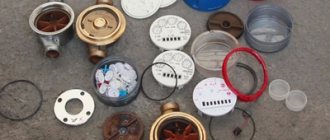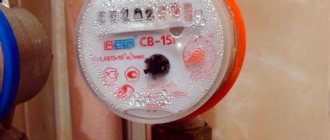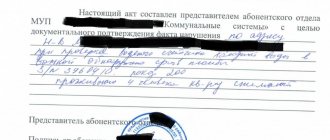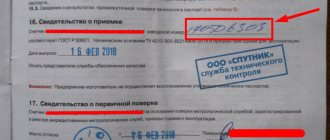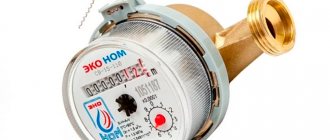How much will you have to pay: amount of penalty for use
If a citizen installs a magnet in order to reduce meter readings, then the state regards this fact as a theft of resources.
Illegal use of water is fraught with penalties for the property owner. An attempt to “save” risks a penalty that is several times greater than the amount of underpaid funds to the budget.
Its amount is calculated ten times the total amount that the state lost as a result of the offense:
- The date from which the testimony is submitted with violations is determined.
- The resource consumption for this period is recalculated.
- The result obtained is multiplied by 10 and the current tariff for water use.
If it is impossible to determine the time of incorrect operation of the meter, then the date of the last check of this type of equipment is used for calculation. But if more than three years have passed since the reconciliation, recalculation is made for the last 36 months.
Violation of anti-magnetic seal
The most loyal in terms of penalties is the water utility. The fine is paid in the amount of 5 times the minimum penalty - on average this is about 1,000 rubles. In some cases, a penalty is also considered, which is equal to the approximate volume of water consumed for a certain period not exceeding 6 months. But in monetary terms, the amount is still less than that of a gas service or energy supply company. To provide additional security measures and prevent theft of natural resources, magnetic stickers are used. This type of seal often makes it possible to identify unscrupulous consumers, as well as limit unauthorized access by unauthorized persons.
Please note => Pregnancy correctional work
What other consequences could there be?
If a violation of the law related to the use of magnets on water meters is established, the following penalties are provided:
- administrative;
- criminal
When brought to administrative responsibility, the standard fine is 300 rubles. increases fivefold (Article 7.27 of the Administrative Code). Repeated violation of the law threatens to initiate criminal proceedings and bring criminal liability.
Petty theft (less than 1,000 rubles) in accordance with the Criminal Code of the Russian Federation entails:
- An administrative fine of five times the amount not received into the budget (but not less than 1 thousand rubles).
- Administrative arrest – up to 15 days.
- Mandatory work – up to 50 hours.
Petty theft (from 1000 to 2500 rubles) is threatened under the Criminal Code of the Russian Federation:
- an administrative fine in the amount of five times the amount not received into the budget (but not less than 3 thousand rubles);
- administrative arrest – from 10 to 15 days;
- compulsory work – up to 120 hours.
In the absence of signs of theft, the offense is classified as causing property damage by deception.
According to Article 165 of the Criminal Code of the Russian Federation, the following penalties are applied:
- Fine (up to 300 rubles or the amount of the offender’s salary for 2 years).
- Forced labor - up to 2 years (with or without restriction of freedom for up to 1 year).
- Imprisonment - up to 2 years (with payment of a fine of up to 80 tr. or six months' salary or without penalties, with or without restriction of freedom for up to 1 year).
If the defendant does not work and has no other sources of income, then by court decision, part of the property is confiscated to pay off the debt.
Fine for a magnet on an electric meter and on a water meter: article on how to pay – Debtor
More and more residents are starting to use magnets because they want to spend less money on paying for water consumption. There are also widespread cases when there is no seal on the meters or it has been torn off.
At the same time, citizens do not think that their actions will ultimately lead not to savings, but to serious financial losses.
Let's take a closer look at what fines can be charged for water that goes past the meter, for the use of magnets, and for breaking seals.
Magnets on water meters: what fine will be collected from an unscrupulous tenant
The Ministry of Construction and Housing and Communal Services has long been concerned about the problem of illegal activities of some residents.
Using various fraudulent schemes, people try to save on water consumption: they put magnets on meters, break seals, and also let water go past the meter. All this is known.
There is a need to fight fraudsters. Here are the measures already being taken.
- An examination using special instruments helps to accurately determine the phenomenon of residual magnetization of the water meter. This is very important, since unscrupulous residents, having learned about the inspection, simply remove the magnets that slow down the operation of the meter. But the residual magnetic field just reveals their illegal actions.
- When such offenses are detected, a significant fine is levied: it is calculated ten times the total amount by which the person managed to defraud the state.
Violations are detected when walking around apartments. The reason for such an investigation is a serious discrepancy between the total readings of individual and communal meters.
https://www.youtube.com/watch?v=GJBCjfz4snw
There are accepted and approved Rules for the provision of public services. In accordance with clause
35, owners and users of premises in apartment buildings and residential buildings, the consumer does not have the right to unauthorizedly break the seals on metering devices and at the places of their connection (attachment), dismantle metering devices and carry out unauthorized interference in the operation of these metering devices.
The magnet on the water meter disrupts the operation of this device, slowing it down and causing incorrect readings, with a deviation in the direction of decrease.
What other liability may there be under the law?
When interference in the internal functioning of a metering device is recorded and officially confirmed, administrative and criminal liability is provided. When brought to administrative responsibility, the standard fine of 300 rubles increases fivefold, as defined in Art. 7.27 Code of Administrative Offenses of the Russian Federation.
Petty theft of someone else's property, the value of which does not exceed one thousand rubles, by theft, fraud, misappropriation or embezzlement in the absence of signs of crimes provided for in parts two, three and four of Article 158, Article 158.
1, parts two, three and four of Article 159, parts two, three and four of Article 159.1, parts two, three and four of Article 159.2, parts two, three and four of Article 159.3, parts two, three and four of Article 159.
5, parts two, three and four of Article 159.
6 and parts two and three of Article 160 of the Criminal Code of the Russian Federation - entails the imposition of an administrative fine in the amount of up to five times the value of the stolen property, but not less than one thousand rubles, or administrative arrest for up to fifteen days, or compulsory labor for up to fifty hours .
Petty theft of someone else's property worth more than one thousand rubles, but not more than two thousand five hundred rubles through theft, fraud, misappropriation or embezzlement in the absence of signs of crimes provided for in parts two, three and four of Article 158, Article 158.
1, parts two, three and four of Article 159, parts two, three and four of Article 159.1, parts two, three and four of Article 159.2, parts two, three and four of Article 159.3, parts two, three and four of Article 159.
5, parts two, three and four of Article 159.
6 and parts two and three of Article 160 of the Criminal Code of the Russian Federation - entails the imposition of an administrative fine in the amount of up to five times the value of the stolen property, but not less than three thousand rubles, or administrative arrest for a period of ten to fifteen days, or compulsory labor for a period of up to one hundred and twenty hours.
In addition, there is liability under the criminal code of the Russian Federation. The punishment according to Article 165 of the Criminal Code of the Russian Federation is as follows:
- imprisonment for up to two years;
- a fine of up to three hundred thousand rubles.
Causing property damage to the owner or other owner of property by deception or abuse of trust in the absence of signs of theft, committed on a large scale, is punishable by a fine in the amount of up to three hundred thousand rubles or in the amount of the wages or other income of the convicted person for a period of up to two years, or by forced labor. for a term of up to two years with or without restriction of freedom for a term of up to one year, or imprisonment for a term of up to two years with a fine in the amount of up to eighty thousand rubles or in the amount of the wages or other income of the convicted person for a period of up to six months. and with or without restriction of freedom for up to one year.
Obviously, the penalty for using a magnet on a water meter is very significant.
Fine for breaking the seal on the water meter
Let's find out what specific fine is charged for a broken seal on a water meter in accordance with current legislation. The punishment is determined by Article 19.2 of the Code of Administrative Offenses of the Russian Federation.
entails a warning or the imposition of an administrative fine on citizens in the amount of one hundred to three hundred rubles; for officials - from three hundred to five hundred rubles.
However, the tenant has the opportunity to challenge the collection of the fine if he manages to prove, for example, with the testimony of witnesses, that the seal was broken accidentally, recently. That is, the person did not pursue any personal goals, and sufficient time had not passed to cause significant damage.
download dle 11.3
Source:
For a magnet installed on the meter, you will be fined 10-15 thousand rubles
The installation of foreign devices on units that analyze the consumption of gas, electricity, water and other resources is prohibited by law.
For trying to save money by slowing down the accrual of spent units, you will have to pay a fine of up to 15 thousand rubles, as well as compensate the stolen money to utility services.
Causing damage on an especially large scale may result in criminal liability.
Forms of punishment
Unauthorized interference with the operation of metering devices is a violation that is punishable under the current laws of the Russian Federation. Responsibility for such manipulations can be administrative and criminal.
The fine if a magnet is attached to the meter is determined depending on the amount of damage caused:
- Admin Code violations imply a penalty for citizens in the amount of 10–15 thousand rubles. Officials may be subject to disqualification, and they will need to pay at least 30 thousand rubles.
- Individuals are liable for causing large losses (above 250 thousand rubles) under the Criminal Code. Sanctions include a fine of up to 300 thousand rubles. or imprisonment for up to 2 years with seizure of 80 thousand rubles.
The condition of the meters is checked by employees of the organizations that installed them. Upon detection of violations, resource providers also issue a receipt to cover the damage caused.
makamuki0/pixabay
Find out what happens if you don't pay your garbage receipts
Recalculation is carried out from the date of installation of the alien device until the date of its removal. It is impossible to reliably determine the exact time the offense was committed. Therefore, the period from the last inspection by specialists of authorized services is usually calculated within six months. Because of this, the fine for a magnet on the meter becomes quite significant.
On a note! To calculate the debt, the sanctions that were in effect at the time the illegal interference was discovered are applied.
Responsibility of the parties to the contract
Utility employees conduct regular meter checks and evaluate:
- integrity of control seals;
- reliability of measurement display;
- presence of mechanical damage;
- indication error.
The law stipulates that such checks must be carried out at least once a year. In this case, the frequency of visits is limited to one per 6 months if the meter is located in a residential premises.
The owner’s responsibilities include careful handling of devices, non-interference in their operation and timely replacement of devices if they have lost the ability to properly perform their functions.
On a note! The period for eliminating detected faults is 30 days.
If the resource provider violates its obligations, this is not a reason to stop the meters. In this case, you can complain, for example, about power surges.
How do magnets work?
The resource consumption reading mechanism of most models of metering devices is a structure made of metal parts. It is this that magnets act on and stop the process of metering the consumption of electricity, water or gas.
Modern meters are equipped with anti-magnetic seals that protect exposed components. The likelihood of stopping them with the help of foreign devices is negligible, but they are easy to damage, especially if you install powerful magnets of unequal strength.
Gulielmus/pixabay
Helpful information! 5 real ways to save energy at home
How is fraud registered?
Trying to save money on your bills results in higher numbers on bills to cover household needs. The situation is this way because resources are supplied to both apartments and common areas.
Example: electricity for the operation of light bulbs in the entrance and intercom is paid jointly by the residents.
It turns out that conscientious citizens who pay off all debts to public utilities on time finance the experiments of violators from their own pockets.
In fact, they steal resources not only and not so much from the state, but they steal the money of their neighbors, which is a direct violation of other people’s rights and freedoms.
Therefore, the measures to prevent such acts change every year, and the punishment for committing them becomes more severe.
Table 1. Magnet detection methods
| Methodology |
Source: https://xn--400-hddak5ear.xn--p1ai/nalogi-i-vychety/shtraf-za-magnit-na-elektroschetchik-i-na-schetchike-vody-statya-kak-oplachivat.html
Procedure for accrual and payment
The basis for calculating a fine is the inspection report of metering devices drawn up upon the fact of the offense. This document is completed during the control check or audit process, which is carried out by authorized representatives.
This procedure can be carried out without warning the owner if the supplier suspects that the meters are not operating correctly (for example, water consumption has sharply and unreasonably decreased or significant discrepancies with similar household devices have appeared).
Since the procedure for holding an event is regulated by law, obstructing its implementation is fraught with serious consequences .
Verification of testimony must be carried out in the presence of the owner and witnesses. The drawn up act is endorsed by the signatures of the executor and the applicant, and a seal. Filling out all details is strictly required.
Based on the results of the inspection, a receipt is received, which must be paid within 30 days in order to avoid subsequent retaliatory measures from the authorities, including:
- water shutdowns;
- foreclosure of wages or other types of income;
- seizure of property;
- ban on leaving the country;
- seizure of bank accounts;
- imprisonment.
You can pay for the receipt in any available way: through online services, including government services, or through the cash desk of the supplier company.
What does the owner of a water meter risk when he stops it with a magnet?
[author_bq]
Current legislation practically obliges every subscriber to install meters on their premises. And many wondered: how can one influence the readings and reduce them? After all, utility prices are constantly rising.
A solution was found - installing magnets on the water meter. A practicing lawyer will tell you how the utility company can detect them and what the consequences of these actions are. Spoiler: we don’t install magnets and we don’t advise you to.
Such “savings” can result in hundreds of thousands (!) of rubles.
How do magnets work on water meters?
The magnet on the device slows down its operation. That is, the counting mechanism with readings stops or begins to rotate more slowly, taking into account the smaller amount of resource consumed.
Simple knowledge of physics allows us to remember that a magnet only acts near a metal object.
In other words, you can get results from its use only if you try to stop the operation of an iron metering device with a magnet. This is a water meter of older models, in which a magnet is responsible for rotating the dial.
Modern water meters are 80% made of plastic material, which means it is useless to use it to stop the water meter.
But you need to know that a magnet leaves traces of influence, that is, a magnetic field. This impact can be detected by a utility company representative during a routine inspection of the water meter.
In everyday life, a neodymium magnet is used for a water meter, which can be easily purchased on many trading platforms. That is, the manufacturers of this item know for what purposes the magnet is used, but there is no direct ban on its sale to citizens for personal use.
The neodymium magnet has a strong field that can stop the dial from rotating. The stop will occur regardless of whether water is being consumed or not, but the water meter will not record the resource consumed.
How do controllers determine that there was a magnet on the meter?
There are several methods by which utility company representatives can determine that they tried to stop the water meter:
- See the presence of a magnet. This mainly happens when residents simply forgot to remove the device from the device, for example, the door is opened by relatives (who are not aware of the presence of magnets). In this case, a violation report will be drawn up, and subsequently charges will be made on it.
- Check indicators on devices. Modern meters are equipped with anti-magnetic seals (indicators) that protect the water meter from interference with its operation. As a rule, when you approach a magnet, the indicator can work as follows:
- turns into a different color and a signal message appears informing about the intervention. Residents may not notice this inscription with the naked eye, but a representative of the controlling organization will always see it;
- the signal beacon explodes with paint spraying inside the eye. Typically, visually, such an antimagnetic indicator looks like a toy eye with a bead rotating in it.
- Measure the magnetic field around the water meter. When using a magnet to stop water meters, it will be very large. These measurements need to be carried out with a special device called a Teslameter. This device is very expensive and is not available in all organizations. However, it is being used more and more often to identify unscrupulous consumers.
Legal and financial implications
From the point of view of current legislation, using a magnet to stop the meter can be regarded as theft. Therefore, use will be accompanied by the imposition of sanctions.
As such, the current legislation does not contain a fine for a magnet on a water meter.
We will talk about unauthorized intervention in the operation of the water meter. There will be no fine, but charges for water consumed during this period will be carried out according to a special formula. The size of the amount will be quite impressive, so many citizens can qualify it as a fine.
In accordance with clause 81 (11) of the Rules approved by Decree of the Government of the Russian Federation of May 6, 2011 No. 354 (Rules No. 354), interference with the operation of the water meter is unacceptable. Therefore, for this purpose, control and antimagnetic stickers are installed on water meters.
Violation of the integrity of the antimagnetic indicator is classified as interference with the operation of the measuring device. Based on the identified violation, an act of unauthorized intervention is drawn up.
The consequences of installing a magnet on a water meter will be in the form of additional charges to the consumer for the entire period of illegal consumption, in accordance with the conditions of clause 62 of Regulation No. 354.
Formula for calculation: capacity of the water pipe * number of days of illegal operation of the meter. That is, you will have to pay as much as if water was flowing from an open tap all the time. This is a very serious amount - tens and hundreds of thousands of rubles, see example of the calculation.
You can determine the number of days for the formula as follows:
- from the date of the previous inspection. This fact must be confirmed by an inspection report of the meter, which will record the absence of damage or defects in the measuring device. It is from the date of drawing up this document that additional accrual will be made;
- three previous months preceding the date of detection of intrusion into the operation of the metering device.
There is no penalty as such for using a neodymium magnet. The subscriber will receive a receipt with huge charges, which he, in accordance with the terms of Art. 155 of the RF Housing Code will have to be paid by the 10th of the next month.
What to do if you are accused of interfering with the operation of the meter
You can find out that the fact of interference with the operation of the water meter has been identified and a magnet for the water meter has been installed only from the act of unauthorized interference with the operation of the water meter. This document must be drawn up in the presence of the consumer himself and signed by him.
The amount of accruals under the act can be found out from the receipt, which will be sent to the subscriber within the period established by law. The size of the charges, as mentioned above, will be impressive.
The subscriber can send a letter to his company requesting an explanation of the accruals made.
Payment of this amount must be made in accordance with the terms of paragraph 1 of Art. 155 Housing Code of the Russian Federation.
If the debt is not paid within the specified period, the utility company has the right to charge the subscriber a late payment penalty in accordance with Part 14 of Art. 155 Housing Code of the Russian Federation.
If payment deadlines established by current legislation are not met, the utility company may collect the debt through the court.
By virtue of the provisions of Art. 122 of the Code of Civil Procedure of the Russian Federation, when collecting debts for utility services, you should obtain a court order. This document is issued by a single judge, without calling the parties to the trial. Therefore, very often unscrupulous payers begin to deal with the debt only after money is written off from their card.
Arbitrage practice
Judicial practice on this issue is quite extensive, since more and more people are saving on utility bills by using illegal methods of influencing measuring devices, causing them to stop.
Source: https://oschetchike.ru/vody/magnit-na-vodoschetchik-posledstviya
Illegal penalties
Reconciliation of meter readings must meet certain requirements . And if the procedure for recording the fact of installing a magnet was carried out in violation of the law, the owner has the right to go to court.
For example, if the act was not drawn up properly or the installation of a magnet on the meter was not proven.
If the controller refers only to the failure of the seal, then this is not yet an indicator of offenses aimed at underestimating meter readings.
The measures of liability for an unsealed device are different and it is easier to prove your case in this situation if you involve witnesses regarding the fact of the case under consideration.
Do I need to change the water meter after a violation is detected?
The installation of a magnet can be detected by external inspection of the meter:
- the magnetic tape or the device body is damaged;
- The magnet on the dial is demagnetized;
- the seal is broken.
As a result, further use of this equipment is not permissible . You will need to replace and install meters, call a specialist to seal and take readings.
All the most important and useful information about water meters is presented in this section.




